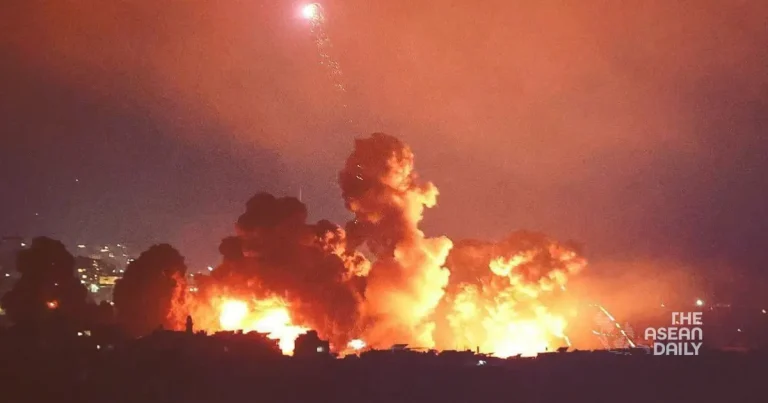6-10-2024 (BEIRUT) Lebanon’s capital was rocked by a series of intense Israeli airstrikes late Saturday into Sunday, targeting the southern suburbs of Beirut, an area long considered a stronghold of the Iran-backed militant group Hezbollah. The bombardment, which lasted nearly 30 minutes, lit up the night sky with flashes of red and white, visible for kilometres around the city.
This latest escalation comes in the wake of a week-long bombing campaign by Israel against Hezbollah positions in Beirut’s suburbs, which has reportedly resulted in the death of the group’s leader, Sayyed Hassan Nasrallah, and possibly his potential successor, Hashem Safieddine.
According to a Lebanese security source, Safieddine has been unaccounted for since Friday, following an Israeli airstrike near Beirut’s international airport that was believed to have targeted him specifically. The Israeli military claims to have eliminated Nasrallah in a strike on Hezbollah’s central command headquarters in Beirut on 27 September, a claim that Hezbollah has reluctantly confirmed.
The ongoing Israeli offensive has severely hampered rescue efforts in Dahiyeh, a densely populated residential area and Hezbollah stronghold south of central Beirut. Lebanese security sources report that continuous strikes since Friday have prevented rescue workers from thoroughly searching the site of Thursday night’s attack.
Hezbollah has yet to comment on Safieddine’s status, but his loss, if confirmed, would represent another significant blow to the organisation and its Iranian patrons. Israeli strikes across the region, which have intensified dramatically in recent weeks, have decimated Hezbollah’s leadership structure.
Israel’s military actions in Lebanon have expanded beyond their traditional scope. On Saturday, the first strike was reported in the northern city of Tripoli, according to a Lebanese security official. Additionally, Israeli troops have launched ground raids in southern Lebanon.
Rear Admiral Daniel Hagari, spokesperson for the Israeli military, stated on Saturday that Israel had neutralised 440 Hezbollah fighters in its ground operations in southern Lebanon and destroyed 2,000 Hezbollah targets. Hezbollah has not released any casualty figures.
The Israeli government justifies the intensification of its assault on Hezbollah as necessary to ensure the safe return of tens of thousands of Israeli citizens to their homes in northern Israel, which have been under bombardment by the group since 8 October.
However, the human cost of this escalation has been severe. Lebanese officials report that hundreds of civilians have been killed, and approximately 1.2 million people—nearly a quarter of Lebanon’s population—have been displaced from their homes.
The violence has also spilled over into northern Israel, with air raid sirens sending residents scrambling for shelters amidst rocket fire from Lebanon. Hezbollah claimed responsibility for firing missiles at what it described as a military industrial facility near Haifa.




